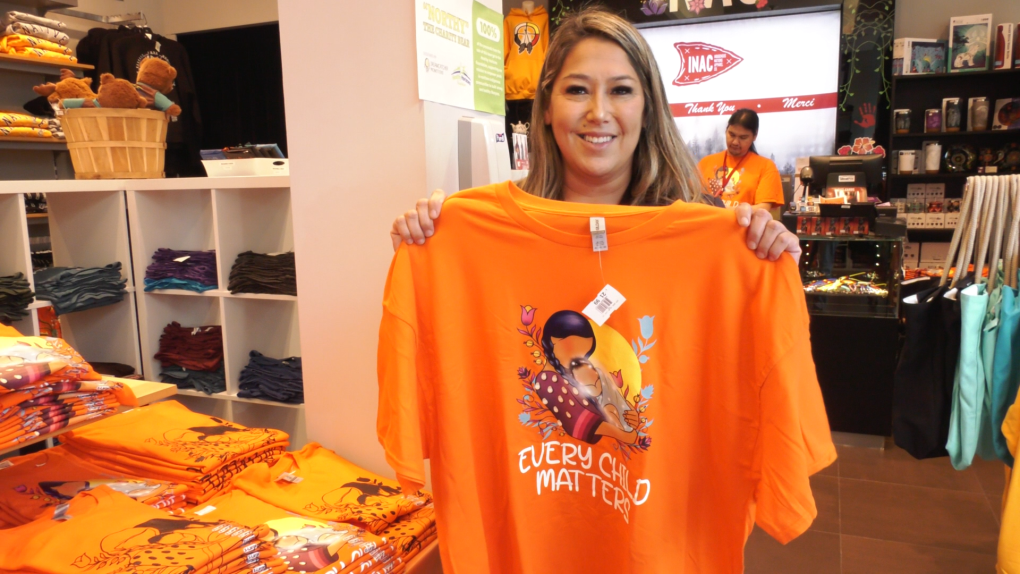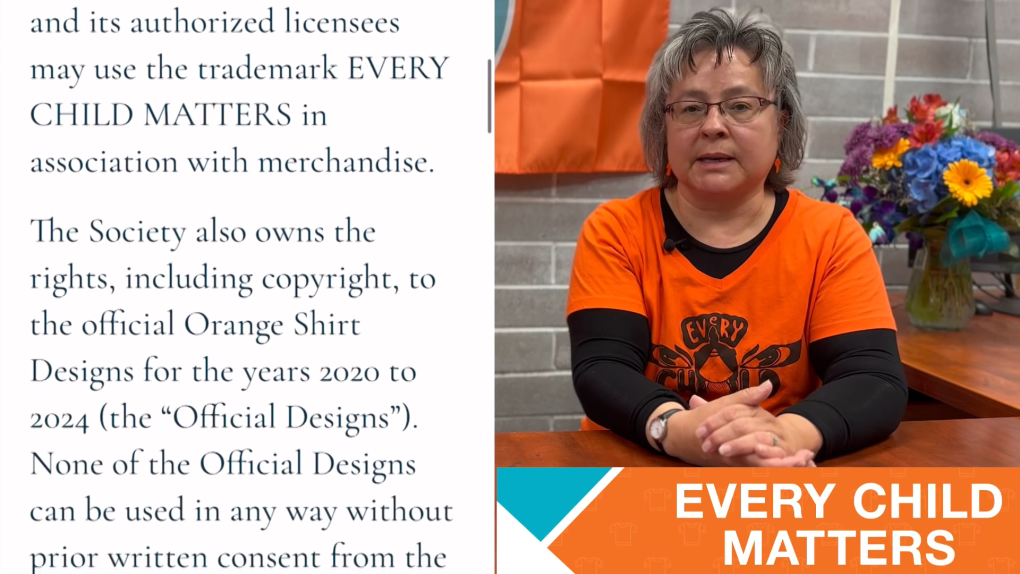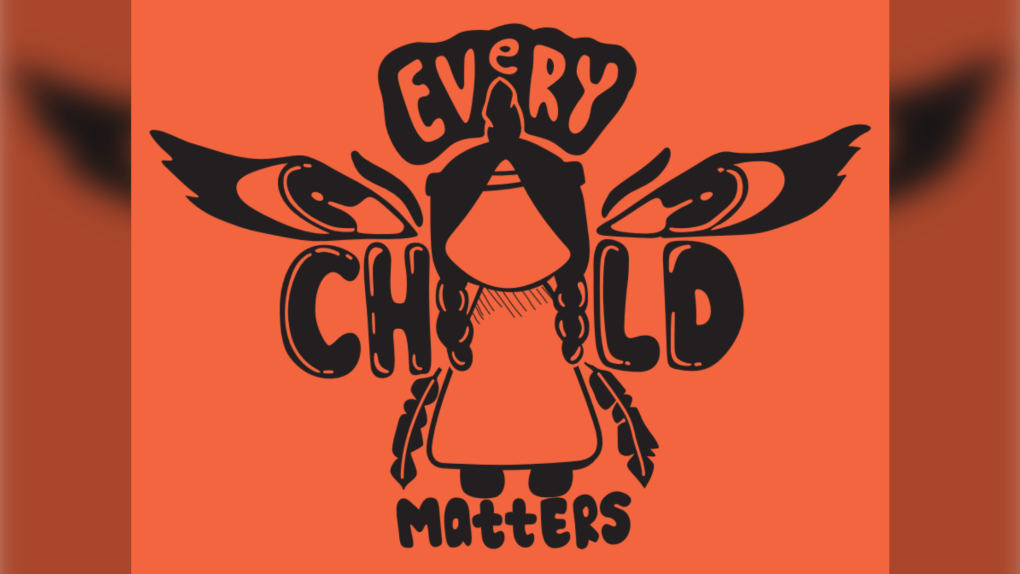Who owns ‘Every Child Matters’?
Sept. 30 is an important and sombre day in Canada.
It is the National Day for Truth and Reconciliation and Orange Shirt Day—a time to remember and acknowledge the impact of Canada’s residential school system.
One of the ways to mark the day is to wear an orange shirt that may have the phrase “Every Child Matters” printed on it.
The three words have come to represent the children who lived through and died within the Canadian residential school system. The schools ran from 1831 to 1996 in all regions of the country. Indigenous children were stripped of their clothing, family, culture, and ultimately their identity.
Orange shirts are sold all over the internet, in big-chain stores and inside small-scale retail stores like INAC in Winnipeg’s CF Polo Park Mall.
It’s an Indigenous-run company that donates a portion of orange shirt sales to organizations supporting Indigenous communities. This year’s orange shirts, like those in the past, are emblazoned with the phrase “Every Child Matters.”
“There’s survivors across Canada,” said INAC owner Michelle Cameron, whose mother is a residential school survivor, “We donate to the National (Centre for) Truth and Reconciliation.”
 Michelle Cameron holding up an orange shirt that is for sale in her store at CF Polo Park on Sept. 24, 2024. (Michelle Gerwing/CTV News Winnipeg)
Michelle Cameron holding up an orange shirt that is for sale in her store at CF Polo Park on Sept. 24, 2024. (Michelle Gerwing/CTV News Winnipeg)
But now, one non-profit organization is laying claim to the phrase in an attempt to control how it is used.
The Orange Shirt Society (OSS) posted a notice of trademark for the phrase “Every Child Matters” on its website.
“The Orange Shirt Society (the “Society”) is the owner of several trademarks, including the phrase EVERY CHILD MATTERS. Only the Society and its authorized licensees may use the trademark EVERY CHILD MATTERS in association with merchandise,” the notice reads.
It also states anyone wishing to use the phrase “with a different design” other than their official design, must first get written consent from OSS. Unauthorized use “may constitute infringement and result in liability”.
The Society also has a Branding and Copyright Policy for using the phrase “Every Child Matters” issued Aug. 15, 2024, and posted to their website. Several guidelines include “Clothing marked with the Trademark must be orange in colour” and “The Trademark shall not be altered in any way and shall not be combined with other elements, visual or otherwise, to create a new symbol or image without prior written consent from the Society.”
It also states the phrase “should not be used in connection with hands similar to those logos for Missing and Murdered Indigenous Women and Girls.” The policy explains while they support the cause, “the Society believes consistency with its branding and messaging is important.”
That doesn’t sit well with Cameron.
“I think ‘Every Child Matters’ is now; it’s just words that belong to everybody,” she said, “That means something to everybody, not just for an organization.”
The Orange Shirt Society’s founder and CEO is Phyllis Webstad. Her personal story of her shiny new shirt, taken away by school authorities, which was given to her by her grandmother to wear at a residential school when she was six, inspired the Sept. 30 day.
 A screenshot of a video posted to The Orange Shirt Society’s Facebook page on Aug. 29, 2024 features founder Phyllis Webstad explaining the trademark notice. (The Orange Shirt Society)
A screenshot of a video posted to The Orange Shirt Society’s Facebook page on Aug. 29, 2024 features founder Phyllis Webstad explaining the trademark notice. (The Orange Shirt Society)
She said the trademark is intended to encourage consumers to buy orange shirts from retailers with a connection to OSS, instead of from a for-profit company.
“We just needed to get control over what’s happening, because it was a free-for-all,” Webstad told CTV News Winnipeg.
She said several retailers, including some from overseas, are profiting for themselves and not giving back to the community or recognizing the day’s spirit.
“We are just horrified by that,” she said, “Our experience is not a fashion statement.”
Cameron said it’s too late for one entity to own the phrase “Every Child Matters.”
“There are many organizations throughout Canada,” she said, “They are trying to say it’s a trademark but it’s not.”
According to the Canadian Intellectual Property Office, OSS’s registered trademark application was filed on May 11, 2020, for the phrase “Every Child Matters”.
“At this time, the trademark application is still pending a decision before the Office,” said Hans Parmar, media relations for Innovation, Science and Economic Development Canada.
Documents posted to the office’s website show evaluators have stated three times that “Every Child Matters” is “not inherently distinctive” to OSS’s goods and services.
“In the case at hand, the mark ‘EVERY CHILD MATTERS’ is a statement that should remain to all traders,” the correspondence states.
OSS filed supporting documents on Feb. 28, 2024, and the office is in the process of preparing a response, which it expects in the coming weeks, according to the office’s statement.
Orange Shirt Society has common law ownership of the trademark: Lawyer
Webstad first shared her story in May 2013 at a reunion event for St. Joseph Mission Residential School in Williams Lake, B.C.
After the event, survivors worked to keep the legacy alive and established Orange Shirt Day. The Orange Shirt Society was officially founded in British Columbia in 2015.
Webstad told CTV Winnipeg that “Every Child Matters” was chosen as the Orange Shirt Day slogan in April 2013.
“We chose ‘Every Child Matters’ first because of my story,” she said, “How I felt when I was at the residential school, that I did not matter.
“It fits with survivors. They were children when they were there. They’re adults and elders now, but they were children when they were there,” she said, “They matter. They still do.”
 The Orange Shirt Society’s 2024 Every Child Matters Orange Shirt design by Aliyah Bautista, a grade 11 student from Ponoka, Alta. Uploaded Sept. 26, 2024. (Aliyah Bautista/The Orange Shirt Society)
The Orange Shirt Society’s 2024 Every Child Matters Orange Shirt design by Aliyah Bautista, a grade 11 student from Ponoka, Alta. Uploaded Sept. 26, 2024. (Aliyah Bautista/The Orange Shirt Society)
OSS’s intellectual property lawyer, Andy Chow, told CTV News that through that use, the OSS has accrued what’s called common law ownership of the trademark.
“You don’t need a registered trademark to enforce the trademark. It’s a secondary tool, and Orange Shirt Society is pursuing that registration, but without it, Orange Shirt Society still has its common law rights,” Chow said.
Winnipeg-based intellectual property lawyer Silvia de Sousa, a partner at Thompson Dorfman Sweatman LLP did not comment on this specific case but told CTV News that using common-law ownership is the easiest way to claim a trademark.
According to de Sousa, entities do not need a registered trademark to authorize licences and can enter into agreements using a common law trademark.
She said you need an entity to own a trademark in Canada.
“So if a movement has an entity behind it, that entity could register or claim a common law trademark if they’re using a word or words to sell a good or a service, and fundraising services is a service,” she said.
She said if there is ever an opposition or infringement, an entity needs to have proof, like a tag or a receipt showing the first sale.
“You have to have good evidence to show that you were the first user of those word or words to sell a good or a service, but that comes down to facts,” de Sousa said.
The Orange Shirt Society has several licensing agreements with large corporations, such as Walmart, London Drugs, and Aritzia, to sell orange shirts. Lawyers for the Society said the agreements are negotiated on a case-by-case basis and would not reveal their worth.
Webstad said the agreements generate revenue to pay staff and operate the Society.
“It is one way of ensuring that we continue to exist,” she said.
When asked why donations should flow back to a single organization, Chow said OSS should have control.
“To permit everyone to use the trademark without Orange Shirt Society controlling it can, and it will result in the brand being lost.”
Chow also said if an organization is donating proceeds to different charities, organizations, or residential school programs, that is considered in the licensing fee.
Back in Winnipeg, Cameron doesn’t have and won’t be seeking a licence with the Orange Shirt Society.
“I wish people would look into that a little bit more because now they want everybody to go through their organization in B.C.,” she said, “I don’t think that’s the right thing to do.”
View original article here Source









